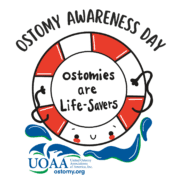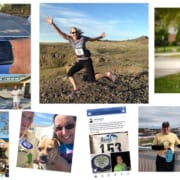The Impact of Advocacy: Healing Yourself and Uplifting Others
By Nicole Richards
“When you stand and share your story in an empowering way, your story will heal you and your story will heal someone else.” – Iyanla Vanzant
I believe this quote accurately describes the importance advocacy is to the ostomy community. Living with an ostomy is a true test to one’s physical and emotional health. Raising awareness is sharing our own personal journey of those physical and emotional experiences with others. It’s only with this vulnerable truth, that we allow other ostomates to normalize their situation. Through advocacy we not only work on our own healing journey, but we inspire and support others on theirs.
This past summer I answered the call to take action from UOAA, and I filed a proclamation request with my state’s Governor for Ostomy Awareness Day. While writing the request I opened myself up to a very vulnerable part of my past that I had stuffed away and never fully processed. More specifically, writing the proclamation request made me realize just how much I minimized my own experience of what life was like pre-ostomy. Another realization I had was that I needed to be more compassionate and forgiving of myself for all that I had been through during that time. This was such an “ah ha” moment for me. I am very grateful for the opportunity I had to advocate and share my story. Had I not have taken the time to revisit the years of my life leading up to ostomy surgery I may not have had the opportunity to heal that part of my past.
The Power of Your Story
It is not only healing for ourselves; it is validating for others who are going through similar struggles. Telling your own personal story helps other ostomates feel less lonely on their ostomy journey; it creates connection and community. Talking about your experiences is not just an act of self-care but an act of service to others.
We experience life differently from one another. My perspective and experience could be completely opposite than that of the next person. With that being said, we tend to resonate with people whose journey is similar. Additionally, many of us not only have an ostomy, but we have an underlying health condition that brought us to the point of needing ostomy surgery. The fact that there are numerous reasons a person might need an ostomy makes us such a diverse group of people. This is why your unique ostomy story matters so much.
These personal stories are more memorable than facts, so they are indispensable in advocacy efforts.
By listening to other people’s perspectives and experiences we create awareness and learn something we didn’t understand. Telling your story is not only important for healing of yourself and others, but ostomies carry many misconceptions. Unfortunately, those misconceptions lead to stigmas and barriers. Through advocacy and sharing our story we aid in the breakdown of those barriers and collectively shed light on the realities of living with an ostomy. Equally important when it comes to advocating on issues for the ostomy community, your voice matters! By telling your story, legislators and policy-makers hear how their constituents are affected. These personal stories are more memorable than facts, so they are indispensable in advocacy efforts.
Based off my interactions with the ostomy community, I can almost guarantee most of us are willing to go out of our way to provide support to one another. Furthermore, I believe most ostomates feel a sense of purpose and fulfillment by helping one another. We are strong and resilient beings who have so many stories and experiences to pass on that could deeply encourage and uplift another in the ostomy community, provide awareness to future ostomates and those struggling with their ostomy.
So, where are you in your healing journey?
I recently read a book called “You Can Heal Your Life” by Dolores Hay. She refers to starting the healing process by “cleaning your emotional closet.” You go in, you pick something up, you examine it, then you either store it away for later or you get rid of it. I love this analogy because it allows you to briefly examine the emotion and decide if now is the time to process and release it, or store it away for later when you feel strong enough to do so.
Are there parts of your ostomy story that have been stuffed away in your emotional closet? Are you ready to look at it so you too can get rid of it? Are you ready to impart some of those experiences that may help others and provide awareness? Maybe through advocacy you can find healing too.
My guess is that if you are an ostomate reading this, you have a story to tell. A personal journey someone else would love to hear, connect with, and find encouragement from. You may keep someone else from feeling alone in their ostomy journey. You just never know who needs to hear from you and your unique lived experience!
Editor’s note: If you are interested in getting more involved with UOAA and advocating for the ostomy community, join their Advocacy Network. Have an ostomy supply or care access issue? Your story matters. Contribute your story for national advocacy. Or you can share your ostomy story on UOAA’s Wall of Love!

 By Sarah Hoag Photography
By Sarah Hoag Photography










Leave a Reply
Want to join the discussion?Feel free to contribute!